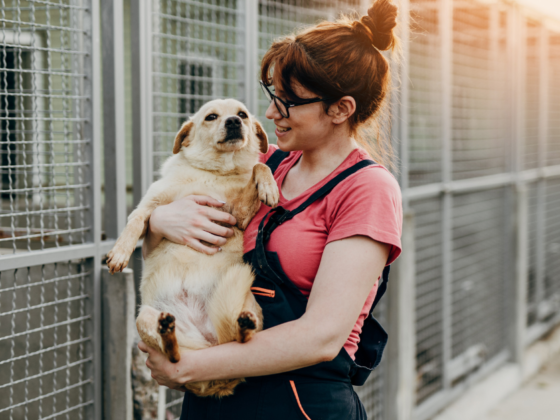If you’ve started your pet adoption journey, you’re probably considering your options. Maybe you’re trying to figure out if it’s a better choice to adopt an older dog over a puppy. Or maybe you’re deciding between your local animal shelter and an animal rescue that you came across online. While you can never go wrong by adopting a pet, it can be a difficult decision to make.
You may even be wondering what the difference is between a shelter and a rescue. It’s such a common question, that we decided to unpack the differences between an animal rescue and an animal shelter. After this you’ll be an expert and may even choose to get involved as a volunteer.
What Is An Animal Shelter?
An animal shelter is considered a facility where homeless animals are housed, cared for, and made available for adoption. According to PETA, every year more than 6 million animals come through animal shelters. Shelters provide safety, care, and comfort for those animals before they can be adopted into their forever homes.
You may be familiar with your local animal shelter, or one in the town over, but according to The Humane Society, there are about 3,500 animal shelters in the U.S. This may seem like a decent number, but compared to the amount of animals in need, shelters become inundated quickly. As a result, shelters can have paid positions and/or volunteers depending on the size and need.
What Is An Animal Rescue?
Where an animal shelter has a paid staff, an animal rescue is often volunteer-run. Some animals that enter an animal rescue are housed in foster homes, while others are housed in rescue facilities. One rescue that’s doing a world of good is Marley’s Mutts Dog Rescue based out of California. The founder, Zach Skow, and his team have rescued and rehabbed thousands of animals.
He even founded a program called the Pawsitive Change Program which rehabilitates “high-risk” dogs by pairing them with incarcerated citizens. They go through a 14 week course that teaches the importance of camaraderie and trust between humans and dogs.
As his program suggests, rescues can be grouped based on breed or even a few breeds with similar characteristics. This may not be the case for all rescues, but it sometimes helps volunteers to have experience with certain breeds. This is especially true for breeds that are known for behavioral or medical issues.
Shelter Vs. Rescue: What’s The Difference?
The aim of animal shelters and animal rescues is to care for and protect animals, but the approach does differ. For one, animal shelters are sometimes funded by a town or city, but many operate as nonprofit organizations.
While there isn’t a national agency to oversee all of these organizations, The Humane Society of the United States (HSUS), and the American Society for the Prevention of Cruelty to Animals (ASPCA) are two large nonprofit organizations that provide guidelines and funding options for animal shelters to follow.
As for animal rescue organizations, many operate without having a dedicated facility, with many animals going into foster homes before being adopted. Some of these rescues are even specialized to handle specific breeds. Volunteers are often well-versed in certain breeds of animals and have experience in caring for them.
At CUDDLY, we provide a platform for animal welfare organizations to raise funds and create Rescue Wishlists to directly support animals in need. We partner with more than 3,500 shelters and rescue organizations nationwide to support animals in need at every stage of their journey.
Animal Shelter Pros and Cons
Animal shelters often run with a paid staff, but some do still have volunteers to help with caring for the animals. In the past, animal shelters were typically considered as animal control or the pound, but these are more antiquated terms that no longer suit the shelter experience. Now, there is more attention to the specific care needed for individual animals.
However, one of the major cons to an animal shelter is the potential of an animal being euthanized due to a variety of reasons. While this may seem unkind, or harsh, often veterinarians at the animal shelter must decide the animal’s quality of life. Many of these animals may have health issues or a past medical history that would prevent them from being adopted.
However, this should never deter you from either volunteering at or adopting from an animal shelter. Employees and volunteers work tirelessly to care for so many animals in need. You can also seek out animal shelters that are committed to “no kill” practices.
Animal Rescue Pros and Cons
Animal rescues are run by dedicated volunteers who have a true passion for the animals they aid.
Believe it or not, animal rescue organizations can be more difficult to adopt from than animal shelters. This is because the rescue volunteers ensure the right person is suited to care for any potential needs of an animal. This could also mean that particular people are meant to adopt rescued animals if they have certain medical or behavioral situations that require expert care.
However, on the flip side, rescues offer those with particular knowledge of a certain breed or with veterinary care the chance to provide that highly specialized care.
Is It Better To Rescue Or Adopt?
Bottom line, helping to care for any animal in need is noble. You should never feel that one is “better” than the other. Your choice will depend on how well-versed you are with potential medical needs, a breed’s history and temperament, and even with changing your lifestyle to accomodate a new addition.
Location may make a difference in where you end up searching for your pet. Your local shelter may be farther away than a closer rescue – and vice versa. While some people choose to drive to adopt a pet, others find it easier to seek out their local shelter/rescue.
You can always call or email a local rescue or shelter to see what option makes more sense for you. There are always animals in need at both. So you can’t go wrong.
How Much Does It Cost To Adopt A Dog From A Shelter?
While there isn’t a standard cost for adoption, according to Chewy, shelter staff report fees from $50 to $350 or more. Each shelter has their own factors for determining cost but much of this cost goes toward care and veterinary services including:
- Wellness Exams
- Deworming or other preventative care
- Vaccinations – These can range from rabies, distemper, parvovirus, or Bordetella
- Administrative fees – Often covers the cost of processing paperwork
- Spaying or Neutering – Not all shelters offer this, but it is a preventative measure to consider
This isn’t an exhaustive list, or even the standard for every shelter. It also doesn’t include the basic at home essentials that you will need for your pet (collar, leash, bed/crate, food, and toys of course). Each shelter will differ in cost and what is included in an adoption fee. However, you can always call or visit your chosen shelter to ask about what is included in the adoption process.
How Much Does It Cost To Adopt A Dog From A Rescue?
According to an article from the Dodo, adoption fees from a rescue can range from $50 to $750. You should also be aware that there are a few things to budget for before bringing your best friend home. You may want to pick up the basics like a collar, leash, a bed, and some toys and food to start. The adoption fee also depends on the breed of the dog, the facility, and your specific location. Some of the included items often include:
- Wellness Exams
- Deworming or other preventative care
- Vaccinations – These can range from rabies, distemper, parvovirus, or Bordetella
- Administrative fees – Often covers the cost of processing paperwork
- Spaying or Neutering – Not all rescues offer this, but it is a preventative measure to consider
This breakdown is quite similar to animal shelters, which is a great thing. It’s great to have a standard practice throughout the country. This ensures that all animals are receiving equal care, no matter the circumstance. It also educates new owners on the veterinary side of animal care. You should always work to keep your pet up to date on vaccinations and any necessary exams. It will give you peace of mind and keep your pet healthier in the long run.
Final Thoughts: What’s The Best Option For You?
The best option for you will always depend on your specific situation. If you are familiar with a certain breed, then maybe a specific rescue is the better option for you. However, if you’re looking for more information, or a mixed breed, then maybe your local shelter might be a better option.
However, much of your decision should be based on your living situation, understanding of specific breeds, and potential willingness to handle any medical issues that could arise. While there is never any guarantee in life, volunteers and staff at rescues and shelters can help to explain the process in greater detail. Again, each rescue and shelter differs depending on requirements and fees.
If you’re still debating whether a rescue or shelter is right for you to adopt from, check out our Success Stories page to see the power of second chances. We have countless inspiring journeys and stories for you to see how so many pets’ lives have changed thanks to the kindness and compassion of their adopters.












